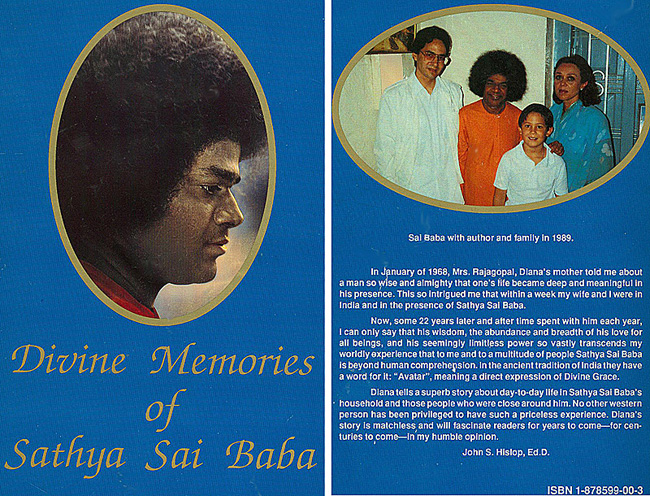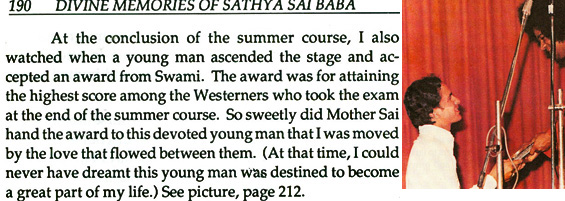
Author Diane Baskin - self-effacing devotee of Sathya Sai Baba

Diane Baskin's self-enhancing and Sai-praising book 'Divine Memories of Sathya Sai Baba' which abounds in photos of herself with Sai Baba, richly deserves the category 'hagiography'.
The book's credibility is spoiled with constant gushing encomiums and hyperbole about her perceived 'God Almighty', and she also relied on unsourced hearsay. All typical of hundred of accounts in books by devotees who sought his 'divine blessings'. She first came to prominence in the Sai Baba movement through a story about her first husband, a Hollywood actor Joel Riordan, whose doubtful story Howard Murphet recorded as 'the rainbow man miracle'. After her divorce from Joel Riordan around 1974-5, Diane was told by Sai Baba to marry one of his favourite prize-winning students, Robert Baskin. She described how she first saw him.

Note: it has been testified by other students that those students who Sai Baba favoured most - such as his special 'form boys' - were often on intimate terms with him. He married off Baskin - who later became a lawyer - and gave him many privileges, whereupon Baskin defended his chosen head of the Sathya Sai Society of America in a lawsuit. Baskin later invested a lot in a luxury villa for a Sai Baba promised visit. See here.
In her book, she wrote (p. 124-5) about how a simple misjudgement caused her small party of devotees to fail to arrive at a renzedvous that Sai Baba had given them. When finally Sai Baba arrived in Ooty after having missed them and waited,: "Swami came straight to our room and in a very strong and severe tone said: "Where were you? Do you know that I waited four hours for you? I sent the boys up and down the roads looking for you." He did not even give us a chance to answere, but went on scolding."
Admittedly, it is no fun to wait around and few would not be irritated. A few would get angry, as Sai Baba clearly did, and he acted unreasonably in not hearing their reasonable explanation of the mix-up. Yet how come he did not know where they were, having proclaimed himself totally all-knowing? As a totally one-sided 'true believer', Diane Baskin had become wholly incapable of blaming Sai Baba for even the slightest thing… there had to be a deeper explanation for her. She wrote on: "Swami is so powerful in feigning anger that we felt as small as ants, and wished we could have disappeared into the ground. Of course, at the moment, we did not think or react as though His anger was not real."
Being unaccountable to anyone for anything, Sai Baba did not need to explain that he simply lost his temper. He cowed them with his forcefulness, as he gradually discovered from boyhood that he could do with so many who admired him. Baskin, like countless others, was easily distracted from normal perception into his crafty doctrine that he is perfect, never angry in reality, that all is a show (for some arcane purpose they could search their souls continually to discover in their own failings). To explain herself, Baskin continued: "Once, when Swami scolded another lady, I was so shaken that I had asked Swami if He actually had been angry." (Her question alone shows how brainwashed she was). "He laughed and answered that He never gets angry, for if He should, He would burn everything to ashes." To boast such superhuman power was absurd enough, but for him to think it impressive was yet more so… having proclaimed his eternal nature was nothing but universal love and compassion, perfect goodness and all the rest!
Baskin again: "Many times I have seen Him give someone a terrible scolding and then, just as suddenly, break into the sweetest smile possible. In a split second, Swami can transform, as even the greatest actor is not able to do, to any range of expression and emotion."
This says more about Baskin's delusion that Sai Baba, for his changeable behaviour is prototypical of many psychopaths who use exactly that kind of ploy to manipulate and control others, repeatedly charm then punish. Note that she over-embroiders her account "the sweetest smile possible"? How long is the "split second"' which surpasses "even the greatest actor", and how many great actors did she observe?). How did she know he could emulate "any range of expression and emotion".
"The following morning, without any of the ladies seeing Him, Swami came to our room and was His sweet, usual Self. In fact, He greeted us as though nothing had happened. We touched his feet with gratitude and followed Him to the dining room for breakfast."
What a humilating relationship to have had to such a rogue and sociopathic charlatan!
Belief in Sai Baba's irrelevant replies to questions was rationalized by Baskin: She pointed out there also that the correct way to approach Baba if one is to avoid the unfortunate results of getting only what one wants is to ask what "What do You want, Swami". She gives an instance of Baba's dissemblance. "When Swami told me I was one hundred percent Indian, I took it as a compliment, because at that time I was trying so hard to be like one of them. I thought they were far superior to Westerners. Now I realize He was gently mocking me and trying to awaken me to the fact that there is no superior or inferior, and no need to be like anyone else." ('Divine Memories' op. cit. p. 233)